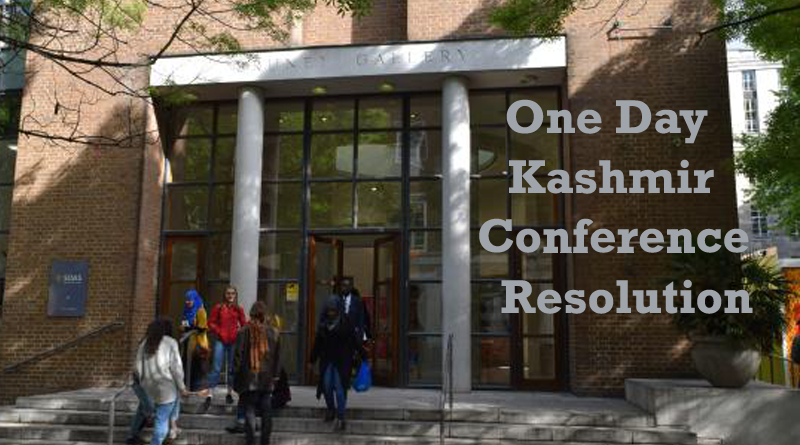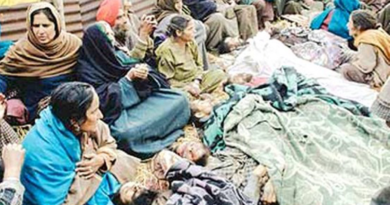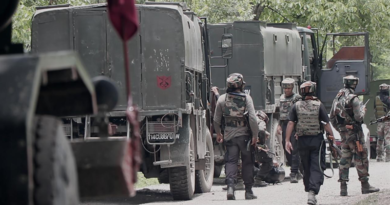One Day Conference on Kashmir in London: The Resolution
Commemorating the 63rd death anniversary of the great poet-visionary Allamah Iqbal, a one-day Conference on Kashmir was held on 21st April, 01 at Brunei Gallery, School of Oriental and African Studies (SOAS), University of London, London, U.K. The Conference was organised by Mahaz-Islami (Occupied Kashmir) in collaboration with Al-Ansar(U.K.), to highlight the more fundamental aspects of the Issue of Kashmir. The registration of guests started at 10.40AM, and the proper deliberations starting at 11.45 AM, ended by 5.30 PM, with a one-hour break for Lunch and Zuhr in between. Among the main speakers at the Conference were, Dr Syed Inayatullah Andrabi, Convenor, Mahazi-Islami, Dr Momin Chaudry, Brigadier(r) Usman Khalid, Leader, Al-Ansar, Lord Nazir Ahmed, House of Lords, Syed Ali Shah Geelani, senior Kashmiri leader( by telephone), Alastair Lamb, senior South Asia specialist and author, Victoria Schofield, Kashmir expert, Dr Jagjit Singh Chauhan, Leader Khalistan Movement, Dr M Hazarika, Assam Watch(U.K.). In the light of the day-long deliberations, a resolution was unanimously passed at the end of the Conference, which reads:
Iqbal Day Resolution on Kashmir
This Conference held on Iqbal Day – 21st April 2001 – at Brunei Gallery, SOAS, University of London, recognises that:
1) India, both, as a country now, as well as a geographical region before 1947, is a land of communities and great nations.
2) A minority of upper caste Hindus, mostly Brahmins (or neo-Hindus) have been using, since the early nineteenth century, the unfounded and politically motivated concepts of a common Indian nationhood, and uniform Hindu community having had a ‘golden past’ disrupted by Muslims. On the basis of these they have been pursuing the ambition of imposing their communal dominance over whole of India through an Indian national movement. Indian nationalism is, therefore, imperialism in disguise. It is as vicious in its methods as Nazism and as diabolical in its objectives as Zionism.
3) The Indian National Movement led by Gandhi represented the above imperial ambitions before 47, and now the same is represented by the state of India.
4) Although the imperial ambitions of Indian nationalists were resented to by nations like Sikhs and Dalits, yet it was only the Muslims who could successfully challenge this imperial drive of Indian nationalists by establishing their own political entity Pakistan. Pakistan is, therefore, a living testimony to the truth of distinct existence and political rights of all the nations now trapped in Indian union. In other words,the mere emergence and survival of Pakistan symbolises the cause of democracy and freedom in South Asia.
5) Because of a host of internal and external factors, Pakistan has not been able to act as a vanguard in the movement for the emancipation of nations now under Indian Union.
6) 1971 is not the year of liberation or freedom for the great Muslim community of Bengal; it is a triumph of fascist Indian hegemonic forces represented by the state of India.
7) Conflict in Kashmir is the continuation of the same conflict, namely between the forces of freedom in South Asia and the imperial designs of Neo-Hinduism.
8) The continuing system of apartheid in India because of its rigid and age-old caste-system is a matter of extra-ordinary concern for all the individuals and nations, who value human dignity and freedom.
The Conference recommends that:
a) Having made out the argument of Muslims being a distinct political community, and validated the same over the past 53 years, Pakistan should now move beyond two-nation theory to multination theory about the sub-continent, so that the oppressed non-Muslim nations also like Sikhs, Dalits, Assamese derive moral strength and support from Pakistan.
b) Jihad should continue in Kashmir until India’s will to keep holding on to it is completely defeated, and Pakistan should support the Movement in all possible ways.
c) The political leadership in Kashmir should remain loyal to the Cause of jihad, which alone confers them legitimacy in the court of people and history.
d) In view of its long history of political subversion and intrigue in that country, Muslim countries, particularly the neighbouring countries, should make sure that India is kept out of Afghanistan.
e) Nuclear capability and a friendly regime in Afghanistan are the great security assets for Pakistan which are worth guarding; these should not be compromised under economic or political pressures – internal or external.
Issued by: Dr Syed M. I. Andrabi,
London (U.K.) 23rd April, 2001
***
Dr. Syed M Inayatullah Andrabi is a well-known figure in the circles of political Islam. Born in Srinagar, the capital city of Indian Held Kashmir, Dr Andrabi has been intimately involved at the intellectual level with the global politics and political issues since his student days in 1980 at Pune (India), where he completed his Ph.D. in Linguistics in 1983 at the Centre of Advanced Study in Linguistics, Deccan College, University of Pune, Pune, India. Upon completing his doctorate he returned home to join the University of Kashmir, first on a post-doctoral fellowship and later as faculty, but could not continue because of the deteriorating security situation in Kashmir, and had to move to United Kingdom in 1994 where he continues to live since along with his wife and five children.




